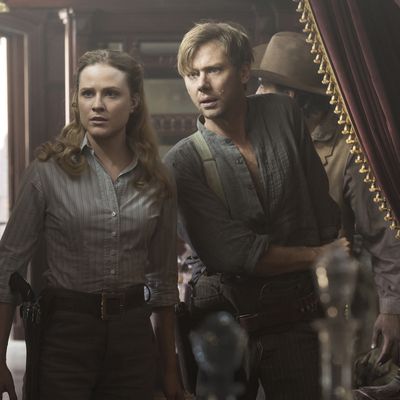
Spoilers ahead for Sunday night’s episode of Westworld.
As you should definitely already know before you read any further in this piece, episode seven of Westworld is a doozy. If you’ve been reading up on your Westworld rumors, are deep in the Westworld subreddits, or are distracting yourself from the end of the world with Westworld podcasts, maybe you already knew about the various clues that Bernard Lowe might be a host, not a human. If you haven’t been, my guess is that news would have come as a bombshell — the episode sets it up as a major twist, with one slight tip-off when Bernard doesn’t see a door upstairs, and then, finally, the revelation: Ford built Bernard, he can control him, and so he uses Bernard to shut down Theresa’s mutiny.
Even if you read the Bernard’s-a-robot theories, the episode treats it like a surprise, building and building to that final unveiling. Of course, Westworld has deployed this exact same twist before. The pilot episode also leans on the surprise-robot move, pulling the wool out from under us by revealing that our audience stand-in, Teddy, who’s led us into the park for the first time and looks around as if everything is new, is actually just another piece of the park’s elaborate mechanisms. The reveals even work in similar ways — it’s something about the basic rules of how the hosts work that finally tips us off. For Teddy it’s the realization that he can’t shoot the Man in Black because hosts can’t harm humans; for Bernard, it’s that pesky door upstairs in Ford’s secret lab that hosts are designed to ignore.
The idea that some of the characters we think are humans are actually hosts is an obvious direction for the show, from the first introduction of its premise. It’s a narrative other-shoe that hangs over each character, constantly threatening to drop. And Westworld does hold back, for a time. After that first Teddy reveal, the show waits until two-thirds of the way through the season before it startles us out of the “huh, there’s actually not all that much plot on this show” complacency with another surprise robot. It’s probably just about enough time for casual viewers to have forgotten to be vigilant about who might not be what they seem. The twist works.
The thing about this kind of twist, though, and the thing that can plague Westworld in the future, is that a twist like this only works a few times before it becomes almost completely meaningless. It is the Battlestar Galactica problem once again: Some of these people are not real, and each subsequent discovery has less and less narrative oomph. By the time we find out that a whole batch of the previously presumed human characters are actually Cylons on Battlestar, the escalations have been ramped up to such an effect that the emotional stakes (and underlying narrative logic) gets strained beyond comprehension. It becomes a surprise-twist arms race, with each new exposure an even more impressive Scooby-Doo-villain-esque unmasking.
This truism of narrative — that an abundance of surprises reduces the impact of each one — is probably intuitive for most of us. But just in case, think of it like the bed-of-nails metaphor. When you step on a single nail, the shock is extreme. When you lay down on a bed of nails, it’s hard to feel the impact of any single one. (You may also recognize this metaphor from its recent use in explaining exactly how a presidential campaign could be utterly riddled with horrifying discoveries, and yet no one scandal actually manages to sink the ship.)
I’m not saying it’s a foregone conclusion that Westworld will fall into this trap. There is plenty of room for it to be like Battlestar in another respect as well. When that series leaned into the deeper implications of its premise, and when it used its sci-fi premise to directly tackle the politics of the world around it, it became deeper, and more grounded. It used a forceful, gutsy time jump in order to present an analogue for resistance and invading forces. Its serious considerations of warring theologies and the results of religious fundamentalism are some of the most interesting science fiction produced about religion in recent memory. But when Battlestar got lost in the weeds of its own mythology and fell into the desperate, futile battle to connect all of its disparate dots while also being surprising yet again, it struggled.
Both of those futures are possible for Westworld. I’m leery, in part because so much of the ethos of the series seems to rely on the puzzle-box storytelling structure — even when the show is not doing the ol’ human-robot switcheroo, its drive seems singularly focused on discoveries, as evidenced by the blossoming body of “our biggest Westworld questions” companion pieces. But unlike Lost or even Battlestar, two of the biggest parallels and cautionary tales in this respect, Westworld is aided by a trend of its own television moment: It only has to contend with ten episodes a season. Hopefully, that limitation will be enough to help it keep the lid on too-bountiful surprises.


